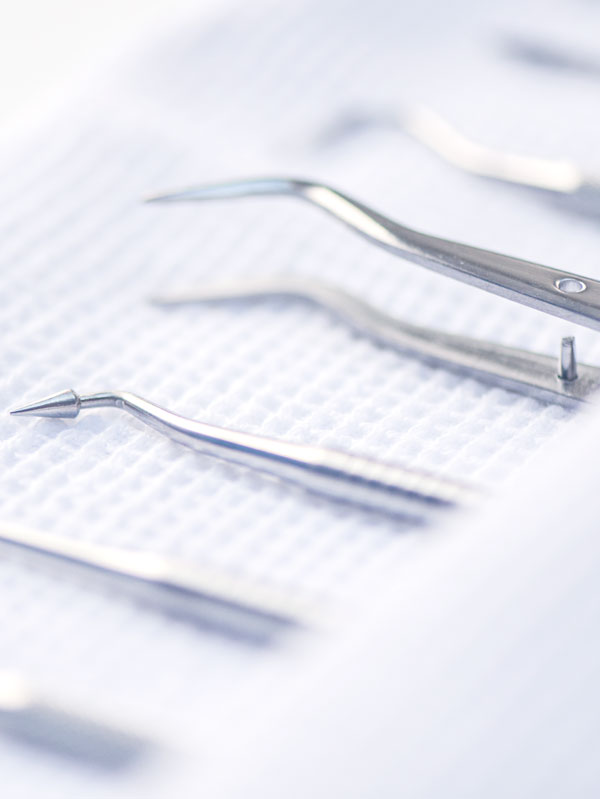Your Paducah Dentist For The Entire Family
General, Cosmetic, and Restorative Dentistry

Call The Office
Phone: (270) 554-2432
Fax: (270) 554-0713
Office Location
2913 Lone Oak Road
Paducah, KY 42003
Email Us
Info@johnsondentalpaducah.com
Welcome to Johnson Family Dental
Dr. Ben Johnson is your local Paducah dentist for the entire family. Unlike some dental groups, Johnson Family Dental is not limited in our scope of work. Your Paducah dentist and the staff at Johnson Family Dental in provides services for your entire family including the following services:
Dental Cleaning
Periodontal Maintenance
Teeth Whitening
Porcelain Crowns
Tooth Colored Fillings
Child Dentistry
Dentures & Partial Dentures
Root Canal Therapy
Bridges
Teeth Extractions
Nightguards
Porcelain Veneers
Cosmetic Bonding
Your Paducah Dentist Knows Best
Is there a proper way to brush?
Dr. Johnson recommends using a soft tooth brush. Position the brush at a 45 degree angle where your gums and teeth meet. Gently move the brush in a circular motion several times using small, gentle strokes brushing the outside surfaces of your teeth. CLICK HERE to learn more about the proper way to brush your teeth
Don’t Forget to Floss!
Flossing is a very effective way to remove plaque from those surfaces. However, it is important to develop the proper technique. The following instructions will help you, but remember it takes time and practice. CLICK HERE to learn more about flossing.
How do I choose oral hygiene products?
There are so many products on the market it can become confusing and choosing between all the products can be difficult. CLICK HERE for some suggestions for choosing dental care products that will work for most patients.
Meet Dr. Ben Johnson – Your Paducah Dentist
Dr. Benjamin Lee Johnson II
Dentist
Dr. Johnson was born and raised in Henderson, KY. He attended Georgetown College where he finished his undergraduate studies with a degree in Biology and Chemistry. He then attended the University of Kentucky College of Dentistry where receiving his Doctorate of Dental Medicine. Dr. Johnson has practiced dentistry for over ten years.
Comprehensive oral health is our goal for all my patients. Dr. Johnson’s philosophy of dentistry begins with healthy gums, the foundation of our teeth. He follows gum health with treatment of decay and tooth replacement. Dr. Johnson stays informed of the newest and best procedures through consistent continuing education. The most rewarding part of dentistry for Dr. Johnson is changing smiles – converting the patient who is too afraid to smile into a patient who can’t wait to smile.
Dr. Johnson met his wonderful wife Molly during their time at Georgetown. They now have three beautiful children. The Johnson’s free time revolves around their children. They enjoy spending time outdoors hiking and fishing as well as attending local family friendly events. When time allows, Molly and Ben like to go see their favorite bands play live. When they travel we love to visit national parks and take in all the natural beauty. The Johnson family are proud Paduchans and love all that our community has to offer.
Frequently Asked Questions
Dr, Ben Johnson has answered some of the most frequently asked questions we hear in our Paducah dentist office.
Why should I have my teeth professionally cleaned?
A dental prophylaxis is a cleaning treatment performed by a professional to thoroughly clean the teeth and gums. Prophylaxis is an important dental treatment for stopping the progression of gingivitis and periodontal disease. Dental Prophylaxis is an effective procedure in keeping the oral cavity in proper health and halting the progression of gum disease.
How often should I have my teeth professionally cleaned?
Professional dental cleaning can be performed at our office. We recommend that prophylaxis be performed twice annually as a preventative measure, but should be completed every 3-4 months for periodontitis sufferers. It should be noted that gum disease cannot be completely reversed, but dental prophylaxis is one of the tools Dr. Johnson and Our team can use to effectively halt its progression.
Is there a proper way to brush my teeth?
Dr. Johnson recommends using a soft tooth brush. Position the brush at a 45 degree angle where your gums and teeth meet. Gently move the brush in a circular motion several times using small, gentle strokes brushing the outside surfaces of your teeth. Use light pressure while putting the bristles between the teeth, but not so much pressure that you feel any discomfort.
When you are done cleaning the outside surfaces of all your teeth, follow the same directions while cleaning the inside of the back teeth.
To clean the inside surfaces of the upper and lower front teeth, hold the brush vertically. Make several gentle back-and-forth strokes over each tooth. Don’t forget to gently brush the surrounding gum tissue.
Next you will clean the biting surfaces of your teeth by using short, gentle strokes. Change the position of the brush as often as necessary to reach and clean all surfaces. Try to watch yourself in the mirror to make sure you clean each surface. After you are done, rinse vigorously to remove any plaque you might have loosened while brushing.
I have sensitive teeth. What should I do?
Sometimes after dental treatment, teeth are sensitive to hot and cold. This should not last long, but only if the mouth is kept clean. If the mouth is not kept clean the sensitivity will remain and could become more severe. If your teeth are especially sensitive consult with your doctor. They may recommend a medicated toothpaste or mouth rinse made especially for sensitive teeth.
Is there a proper way to floss?
Flossing is a very effective way to remove plaque from those surfaces. However, it is important to develop the proper technique. The following instructions will help you, but remember it takes time and practice.
Start with a piece of floss (waxed is easier) about 18” long. Lightly wrap most of the floss around the middle finger of one hand. Wrap the rest of the floss around the middle finger of the other hand.
To clean the upper teeth, hold the floss tightly between the thumb and forefinger of each hand. Gently insert the floss tightly between the teeth using a back-and-forth motion. Do not force the floss or try to snap it in to place. Bring the floss to the gumline then curve it into a C-shape against one tooth. Slide it into the space between the gum and the tooth until you feel light resistance. Move the floss up and down on the side of one tooth. Remember there are two tooth surfaces that need to be cleaned in each space. Continue to floss each side of all the upper teeth. Be careful not to cut the gum tissue between the teeth. As the floss becomes soiled, turn from one finger to the other to get a fresh section.
To clean between the bottom teeth, guide the floss using the forefingers of both hands. Do not forget the back side of the last tooth on both sides, upper and lower.
When you are done, rinse vigorously with water to remove plaque and food particles. Do not be alarmed if during the first week of flossing your gums bleed or are a little sore. If your gums hurt while flossing you could be doing it too hard or pinching the gum. As you floss daily and remove the plaque your gums will heal and the bleeding should stop.
There are so many oral hygiene products on the market. How do I know which ones to choose?
There are so many products on the market it can become confusing and choosing between all the products can be difficult. Here are some suggestions for choosing dental care products that will work for most patients.
Automatic and “high-tech” electronic toothbrushes are safe and effective for the majority of the patients. Oral irrigators (water spraying devices) will rinse your mouth thoroughly, but will not remove plaque. You need to brush and floss in conjunction with the irrigator. We see excellent results with electric toothbrushes like Sonicare and Oral-B.
Some toothbrushes have a rubber tip on the handle, this is used to massage the gums after brushing. There are also tiny brushes (interproximal toothbrushes) that clean between your teeth. If these are used improperly you could injure the gums, so discuss proper use with your dentist.
Fluoride toothpastes and mouth rinses, if used in conjunction with brushing and flossing, can reduce tooth decay as much as 40%. Remember, these rinses are not recommended for children under six years of age. Tartar control toothpastes will reduce tartar above the gum line, but gum disease starts below the gumline so these products have not been proven to reduce the early stage of gum disease.
Anti-plaque rinses, approved by the American Dental Association, contain agents that may help bring early gum disease under control. Use these in conjunction with brushing and flossing.
Lorem ipsum dolor sit amet, consectetur adipiscing elit, sed do eiusmod tempor incididunt ut labore et dolore magna aliqua. Ut enim ad minim veniam, quis nostrud exercitation ullamco laboris nisi ut aliquip ex ea commodo consequat.
Latest News & Tips From Your Paducah Dentist
Johnson Family Dental is pleased to share information and tips to help improve your dental health. Click on any post below to read the full content.

Book An Appointment
Call Us For An Appointment
Phone: (270) 554-2432
Office Hours
Monday-Thursday 8am-5pm
Our Address
2913 Lone Oak Rd
Paducah, KY 42003
Website by: Website Design Works, Paducah


